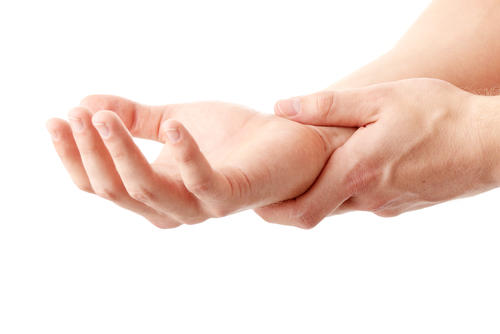


It may come as a surprise when you may reach out to grab something, and suddenly your right arm twitches. For some it can be alarming. Muscles that twitch on their own beyond our control is worrisome. This is known as fasciculation. It happens when the nerves in the muscles respond to changes in the nervous system, bloodstream or injury. Muscle twitches actually happen all the time, we just don’t notice them. If they are noticeable and uncomfortable, you may have something that needs addressed.

 If you drink too much coffee or caffeinated products, you may notice your muscles get a bit “twitchy.” You may just be having your normal few cups of “joe” to wake up, but you may be overdoing things.
If you drink too much coffee or caffeinated products, you may notice your muscles get a bit “twitchy.” You may just be having your normal few cups of “joe” to wake up, but you may be overdoing things.
The maximum daily intake of caffeine is around 400mg per day for a full-grown adult. For teenagers, the maximum amount is about 100mg per day. Many popular energy drinks contain far more than these limits. Add those to coffee, caffeinated soda, and some foods can make you easily go over the daily limits.
Other Symptoms: Increased anxiety, dry mouth, frequent urination, shaky hands, and racing heart.
Right arm twitching may be a sign of low magnesium levels. Magnesium is found in foods like nuts, seeds, leafy greens, whole grains, black beans, and many other foods. Not eating enough magnesium containing foods may cause a deficiency. You may also be doing things to deplete your body’s magnesium stores. This includes diuretic medications, too much coffee, alcohol use, and stress.
Other Symptoms: headaches, fatigue, anxiety, muscle spasms, insomnia, and chronic pain.
Calcium builds healthy bones, and helps regulate the nervous system. One of the signs of low blood calcium is muscle twitching. You may have a health condition that causes your calcium levels to drop, or you may not be eating enough calcium containing foods like milk, cheese, yogurt, spinach, nuts, and salmon with bones.
Other Symptoms: Muscle spasms, confusion, irregular heartbeat, seizures, and vision issues.
 Are you feeling fearful? Do you feel like something bad is about to happen? Do you want to get out of your chair and run, and don’t know why? Asking yourself why your right arm twitches or even another part of your body? These are all signs of an anxiety attack, and it can also make your muscles twitch. When you have an anxiety or panic attack your breathing naturally increases. Increased breathing lowers your calcium levels temporarily, which can cause twitching. Also, the hormones that cause anxiety can reach the nerves in your muscles making them “act up.”
Are you feeling fearful? Do you feel like something bad is about to happen? Do you want to get out of your chair and run, and don’t know why? Asking yourself why your right arm twitches or even another part of your body? These are all signs of an anxiety attack, and it can also make your muscles twitch. When you have an anxiety or panic attack your breathing naturally increases. Increased breathing lowers your calcium levels temporarily, which can cause twitching. Also, the hormones that cause anxiety can reach the nerves in your muscles making them “act up.”
Some people have a severe form of anxiety known as agoraphobia. They get these “scared” feelings when they leave their house or comfort zone. It may also manifest in social situations, large crowds, or shopping areas.
Other Symptoms: Fast heartbeat, tightness in chest, shakiness, feelings of dread, muscle cramping, and stomach upset.
If you have recently injured your arm, you may have damaged a nerve. This is known as neuropathy which can also happen due to chronic conditions like diabetes, lupus, multiple sclerosis, heart disease, and alcoholism.
Neuropathy can cause twitching in your arm, hands, feet, and legs. It can also affect your skin, and your organs inside your body.
Other Symptoms: Pain in the arm that is sharp, fingers tingling, numbness in hand, and squeezing sensations.
If your right arm is twitching and you find it happening repeatedly, you may need to see a doctor. You may also need to get emergency medical care immediately if you have right arm twitching with:
You should also see your doctor if you think you have an injury to your arm or chronic health conditions that may cause twitching. You may need further evaluation of your condition or injuries.
Always have right arm twitching evaluated by a doctor if it continues or seems serious. If you have been given the okay, these things may help: